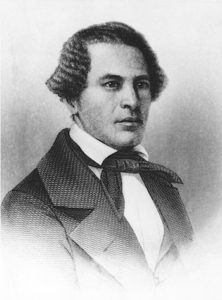
William W. Brown
William Wells Brown was born on this date in 1814. He was a Black abolitionist lecturer, a groundbreaking novelist, a playwright, and a historian.
Brown was born on a plantation outside Lexington, KY, to George Higgins, a white plantation owner and an African slave mother. Brown was sold multiple times before he was 20 years old. He spent the majority of his youth in St. Louis. There, his masters hired him to work on the Missouri River, then a major thoroughfare for the slave trade. He made several attempts to escape, and on New Year's Day in 1834, he successfully slipped away from a steamboat at a dock in Cincinnati.
Brown moved to Buffalo, N.Y., and spent nine years there working simultaneously as a steamboatman on Lake Erie and as a conductor for the Underground Railroad. In 1843, Brown began lecturing on his experiences ending slavery for the Western New York Anti-Slavery Society, one of many American abolitionist groups. Brown eventually also became a lecturer on behalf of women's rights and temperance, but it was as a fugitive slave speaking on the evils of slavery that he was best known.
In 1847, Brown wrote the "Narrative of William W. Brown, a Fugitive Slave," which went through four American and five British editions in its first three years after publication. Between 1849 and 1854, he gave over a thousand speeches in Europe and America and wrote two books. "Three Years in Europe or Places I Have Seen and People I Have Met" and "Clotel, or The President's Daughter: A Narrative of Slave Life in the United States." This became the first drama published by a Black.
As the environment became increasingly dangerous for Blacks in the 1850s, he became a proponent of African American emigration to Haiti. Like some other abolitionists, he also decided that more militant acts were necessary to gain progress in their cause. In 1854, some of Brown's friends raised enough money to purchase his freedom, allowing him to return to the United States.
Over the next two decades, he focused on historical works. These included two histories of the Black race, another history of Blacks and whites in the American South, and a rare military history of blacks in the American Civil War. Brown eventually settled in Boston and practiced medicine there until his death from cancer in Chelsea, MA, in 1884.
Historic Missourians.shsmo.org
The African American Atlas
Black History & Culture: An Illustrated Reference
by Molefi K. Asanta and Mark T. Mattson
Macmillan USA, Simon & Schuster, New York
ISBN 0-02-864984-2